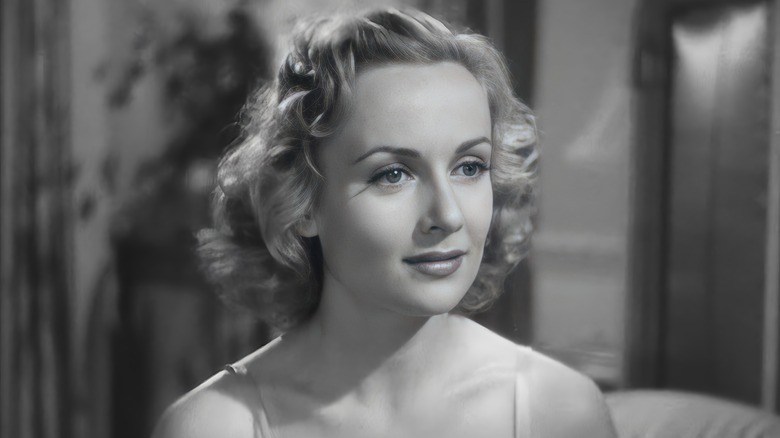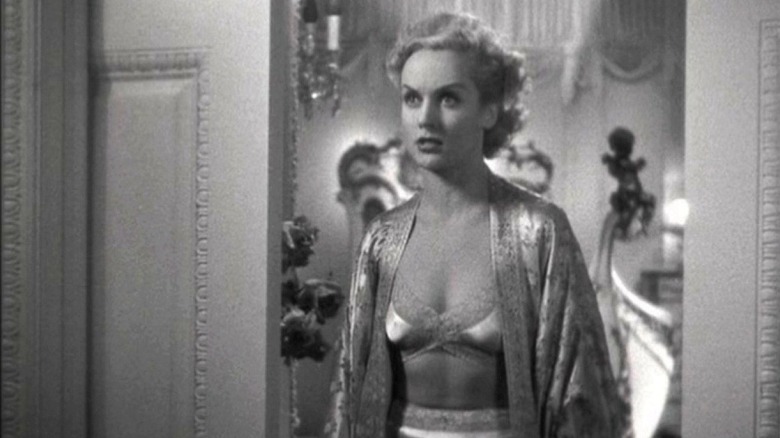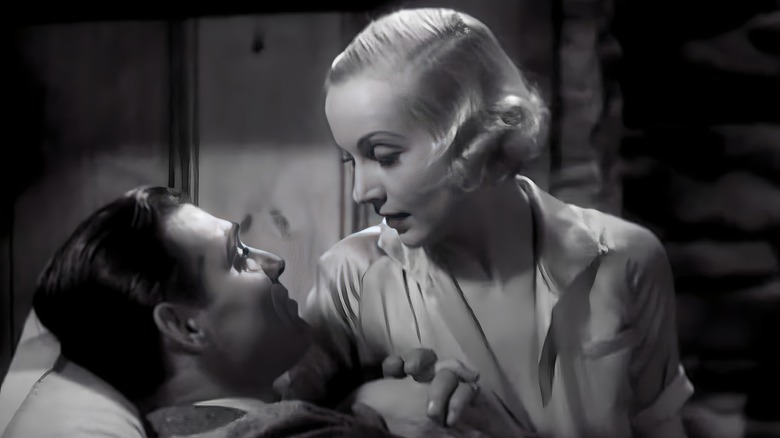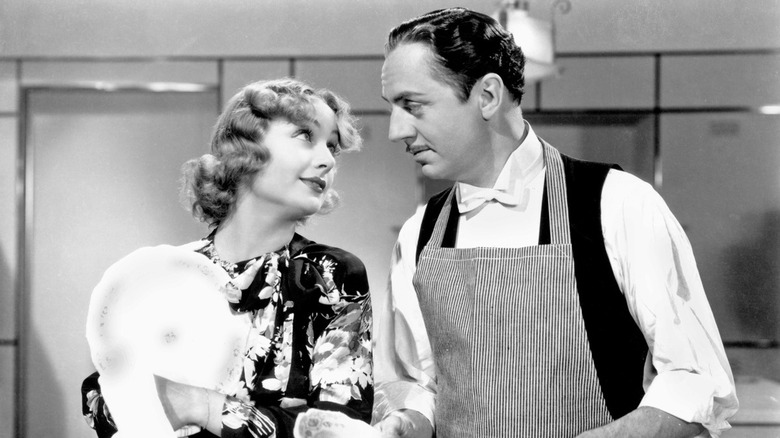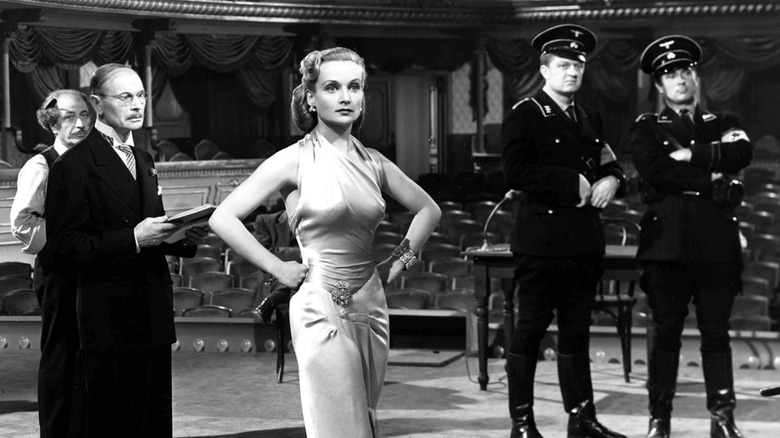Carole Lombard Was The Best Actor Ever
When TWA Flight 3, a twin-engine DC-3 concluding its cross-country route from Indiana to Burbank, California, slammed into Potosi Mountain just outside of Las Vegas in the early evening of January 16, 1942, the movies lost its greatest screwball comedienne.
Carole Lombard was 33 years old, and had just weathered a run of tepidly received dramas to reclaim her stature as one of Hollywood's most dependably hilarious performers via Alfred Hitchcock's "Mr. and Mrs. Smith." She was about to receive another round of critical acclaim for her turn as the Polish theater diva Maria Tura in Ernst Lubitsch's masterful "To Be or Not to Be." She was married to Rhett Butler himself, Clark Gable, and had committed herself to the war effort (she'd been in her home state of Indiana to host a war bond rally). Lombard was as beloved and consequential an actor as there was in the industry, and, just like that, she was gone.
Lombard possessed the rarest of talents. She made daffy look smart. She made double entendres sound refined. There was an elegance to her rapid screwball dialogue; whereas most actors in this genre dashed their words off with a staccato hecticness, she deployed a legato grace. This was complemented at times by a gleeful rowdiness, which, having been a tomboy during childhood — and evidently, one helluva first baseman who more than held her own playing with the boys — came to her naturally.
Her death gutted the whole of Hollywood. Gable fell into an alcoholic rut but recovered when he honored Lombard's patriotic wishes by joining the U.S. Army Air Forces. Gable and Hollywood eventually moved on, but Errol Flynn put it best when he lamented, "Carole Lombard's tragic death means that something of gayety and of beauty have been taken from the world at a time they are needed most."
The breakout
Lombard had technically established herself as a star when her second cousin Howard Hawks cast her as the female lead opposite John Barrymore in the zany screwball classic "Twentieth Century." She was on a seven-film contract with Paramount and sought after for her comedic prowess. But Lombard was consistently better than her pre-code material. There was a dynamite performance primed to explode out of her. That role was Lily Garland, the lingerie-model-turned-theatrical-diva powder keg of the film.
Garland begins the film as Mildred Plotka, a hideously clunky name that simply does not belong on a marquee. She also isn't the most emotive of actors. She's stiff and, most troublingly, intimidated by Oscar Jaffe (Barrymore), the legendary director who's cast her in his latest, self-proclaimed "spectacular." During a rehearsal, Jaffe badgers the insecure ingénue as he tries to coax a blood-curdling scream out of her. He finally gets his desired shriek when he jabs a pin into her backside. In that moment, a star is born.
Hawks' romp really gets cooking when the separated Jaffe and Garland wind up on the same ritzy passenger train. Jaffe plots to win her back before the transport reaches New York City, which sets the stage for a scheme-happy, door-slamming farce. With the veteran Barrymore bringing maximum Sturm-und-drang to the part of Jaffe, Lombard must, like Garland, match his histrionics. She handles her co-star with hammy ease. Garland is Jaffe's monster, and she shall not be mollified. Hawks lets his leads howl and thrash through the final act of the movie, and they make a four-course meal out of the savagely witty dialogue from Ben Hecht and Charles MacArthur. "Twentieth Century" wasn't a hit, but that didn't matter. Lombard had gone toe-to-toe with the finest American actor of his generation. She was undeniable.
The career
Lombard was something of a veteran herself when she starred in "Twentieth Century." She was 12 years old when director Alan Dwan spied her playing baseball in the street with neighborhood kids. Struck by her moxie and nascent beauty, he cast her in the silent drama "A Perfect Crime" (which is, sadly, believed lost). Lombard's comedic chops caught the eye of Mack Sennett, who hired her as one of his "Bathing Beauties." Her career was nearly cut short when she suffered a facial laceration in a car crash. Hollywood has a despicable reputation for discarding women whose looks get marred, but Sennett stuck by her. He believed in her potential, and featured her in his shorts as "Carole of the Curves."
Lombard's ascendence perfectly coincided with the popularity of screwball comedies. She'd paid her dues as a sexual object, and, now in her 20s, possessed the skill and confidence to wield her sly sensuality as a weapon of mass distraction. Off-screen, Lombard was every bit as formidable as Marlene Dietrich. She played the stardom game with extraordinary savvy, and she wasn't vain. When the public rejected her as a dramatic lead, she went back to screwballs with nary a complaint.
Comedy-wise, Lombard struck a palpable chemistry with all of her male co-stars. She brought out Fred MacMurray's too-often-suppressed mischievousness in "Hands Across the Table" and the uproarious "True Confession," and sparred to deliciously spiky effect with Fredric March in "Nothing Sacred." While Lombard thought moviegoers only liked her in comedies, she's tremendously affecting as a conscience-stricken nurse in George Stevens' "Vigil in the Night." When it came to dramas, it wasn't her, it was the thin, formulaic material.
To say that Lombard had a narrow range is unfair. No actor is a finished product at 33. And no actor has ever been as good as she was in "My Man Godfrey" and "To Be or Not to Be."
The defining performance
We should abhor the character of Irene Bullock. When we meet this Manhattanite child of extreme privilege, she is participating in a scavenger hunt that requires contestants to produce a "forgotten man" as an item. There is no shortage of these men in the midst of the Great Depression, and the indigent targeted by her sister, Cornelia (Gail Patrick), firmly rebuffs the cruel offer to be paraded around wealthy jerks. But Irene is tickled by this man named Godfrey (William Powell). She exudes warmth and a lack of pity in his presence. Charmed, Godfrey enters her orbit, becomes her family's butler, and tries like hell to fend off her romantic advances (which could get him fired and flung back out into the streets).
Lombard's Irene is a spoiled brat with a heart of gold. She adores Godfrey, but too often treats him as a rescued dog. Powell's Godfrey is alternately disarmed and disgusted by her antics, especially when she fakes a drunken fainting spell that forces him to rouse her with a cold shower. Lombard plays this moment like a kid who just hit a little-league home run. "Godfrey loves me! He put me in the shower!" As Powell exchanges words with Patrick, Lombard joyfully hops around on a couch in the background.
Again, you want to abhor Irene, but Lombard renders this utterly impossible. "My Man Godfrey" is a version of Richard Donner's "The Toy" where you didn't want Richard Pryor to murder the kid. Irene's got to come down to earth and realize this man is not her pet, but you don't want her to harden too much. Given her moneyed circumstances, she's a miracle of kindness. Lombard is aglow with childlike wonder. No one's ever had more fun in front of a camera, with the possible exception of...
The other defining performance
We should also abhor Maria Tura. She's a bored member of a Polish theatrical troupe who arranges sexless, backstage rendezvous with young admirers timed to her husband Josef's delivery of Hamlet's "to be or not to be" soliloquy. Thankfully, Josef is played by Jack Benny, whose vain, miserly comedic persona always has it coming.
Ernst Lubitsch's "To Be or Not to Be" did not go down well with critics and moviegoers in 1942. Released three months after the United States' entry into World War II, it portrays Nazis, who were presently perpetrating the Holocaust, as boot-licking buffoons, while also operating as a fringe showbiz satire. It all works. Magnificently. And this is largely due to the lightly quarrelsome relationship between Lombard and Benny.
The stars are terrific together, but Lombard is at her best when flirting with Robert Stack's starstruck flyboy Stanislav Sobinski and outmaneuvering Stanley Ridges' traitorous Professor Alexander Siletsky. In every interaction, Maria knows what is expected of her as an attractive woman, and toys with the men who would have her. She's turned on by Sobinski as a bomber pilot who "can drop three tons of dynamite in two minutes," but you get a sense that the dance is, for her, more satisfying than the consummation.
Lubitsch lets Lombard hang in the cut and underplay while Benny does Benny. She imbues Maria with a stoned, spacy distance. She has every single man in the film panting for five minutes alone with her. They're never gonna get it. There's a "Lysistrata" quality to Maria's blue-balling behavior. She can do her part to save civilization by wrecking the male libido. Lombard possessed such witheringly sensual power.
She made you feel blessed to be a sap.
